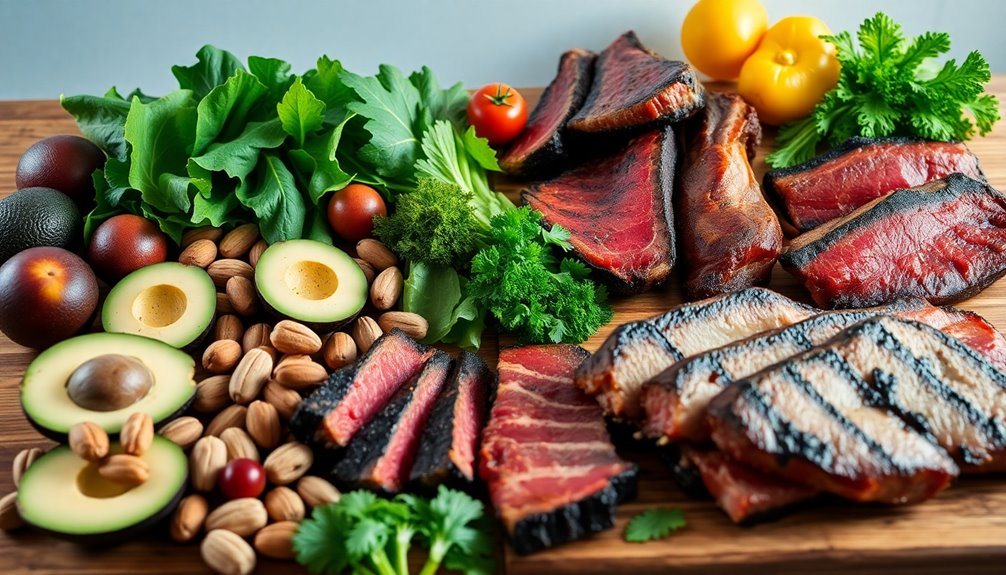The Keto and Carnivore diets differ mainly in food composition and flexibility. Keto promotes a high-fat, low-carb intake with room for low-carb veggies and some fruits, while Carnivore strictly includes only animal products, translating to a nearly zero-carb diet. Keto offers a wider variety of nutrients, making it generally easier to maintain long-term. Both diets may aid in weight loss and improved blood sugar control, but Carnivore can lead to nutritional gaps. If you're trying to decide which diet fits your goals, there's a lot more to explore about their benefits and potential drawbacks.
Overview of the Diets
When you're considering dietary options, it's vital to understand the key differences between the Keto and Carnivore diets.
The Keto Diet emphasizes high-fat and low-carb macronutrient intake, typically comprising 70-80% fat, 20% protein, and only 5% carbohydrates. This approach helps induce a metabolic state called ketosis, where your body burns fat for energy. This diet can also lead to improved insulin sensitivity, making it beneficial for blood sugar regulation. Additionally, the reduced insulin resistance achieved through the Keto Diet can further enhance metabolic health.
In contrast, the Carnivore Diet focuses exclusively on animal products, resulting in a near 100% intake of protein and fat, with zero carbohydrates.
While both diets target weight loss and potential health benefits, the Keto Diet offers more food choices, including low-carb vegetables and nuts. Additionally, the Keto Diet promotes whole, unprocessed foods that can enhance metabolic health and overall well-being.
The Carnivore Diet's extreme restrictions may lead to quicker results, but adherence can be challenging in the long run.
Health Benefits Comparison
Understanding the health benefits of the Keto and Carnivore diets can help you make an informed choice.
The Keto diet promotes weight loss by inducing ketosis, allowing your body to burn dietary fat for energy. It also improves blood sugar regulation by considerably reducing carbohydrate intake. Additionally, the Keto diet's ability to reduce hunger and cravings makes it easier to adhere to dietary restrictions. The diet's enhanced insulin sensitivity is particularly beneficial for individuals looking to manage their blood sugar levels effectively.
On the other hand, the Carnivore diet facilitates weight loss through high protein intake and completely eliminates carbs, providing a drastic approach to blood sugar control.
Both diets may enhance mental clarity and energy levels, but Keto offers a broader range of nutrient-dense foods, including low-carb vegetables.
While the Carnivore diet may reduce inflammation, it raises concerns about nutritional deficiencies due to its restrictive nature, lacking fiber and essential vitamins compared to Keto. Additionally, the Keto diet's focus on insulin sensitivity supports better overall metabolic health by promoting effective glucose uptake.
Potential Drawbacks and Risks
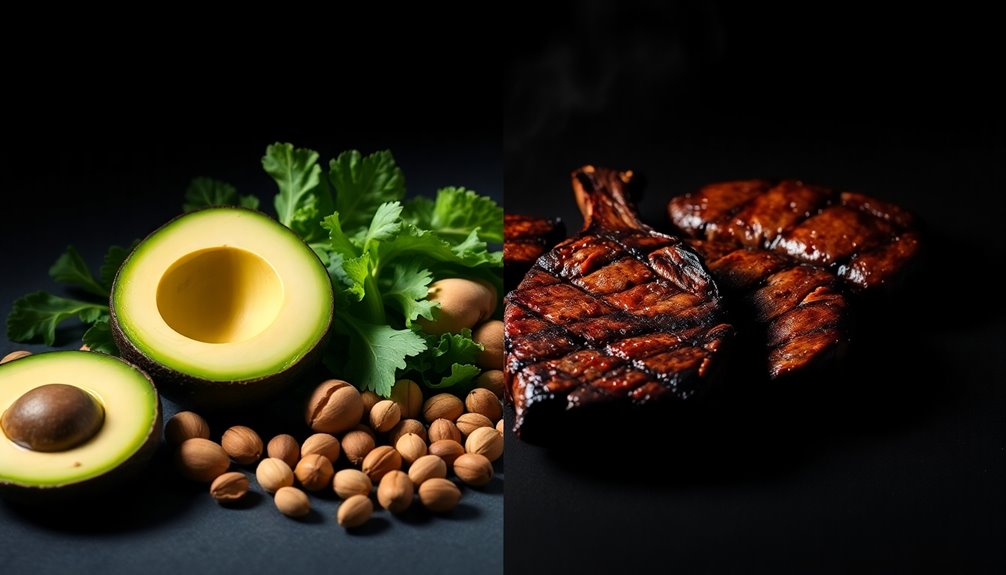
While both the Keto and Carnivore diets can offer health benefits, they also come with potential drawbacks and risks that you should consider.
The restrictive nature of these diets can cause nutritional deficiencies, leaving you lacking important vitamins and minerals. For instance, the Carnivore diet can lead to gastrointestinal issues like constipation due to the absence of fiber. Additionally, both diets can limit the intake of antioxidants that help combat oxidative stress. As a result, individuals may miss out on the benefits of improved insulin sensitivity that come with a more balanced diet.
As you shift into the metabolic state of ketosis on the Keto diet, you might experience "keto flu" symptoms such as fatigue and irritability. This transition can also affect your body's inflammatory response, potentially leading to increased discomfort during the adaptation phase.
Long-term health may also be compromised; both diets can exacerbate pre-existing kidney issues and may pose risks for those with autoimmune disease.
It's crucial to consult a healthcare professional before starting either diet, especially if consuming animal products.
Key Similarities Between Diets
Both the Keto and Carnivore diets share a strong focus on low carbohydrate intake, making them appealing for those looking to cut carbs.
You'll find that each diet emphasizes high protein consumption, whether through animal products exclusively or with a mix of healthy fats. This combination not only aids in weight loss but also offers potential benefits like improved energy levels and better blood sugar control, as both diets can lead to lower blood sugar levels through reduced carbohydrate intake. Additionally, both diets may lead to increased HDL cholesterol levels, which is beneficial for heart health. Furthermore, both approaches can enhance insulin sensitivity, further supporting metabolic health.
Low Carb Focus
When you look at the Keto and Carnivore diets, you'll notice they share a strong low-carb focus that shapes their overall approach to nutrition.
The Keto Diet typically reduces carbs to 5-10%, while the Carnivore Diet aims for a zero-carb diet, relying solely on animal products.
Both diets promote fat for energy, with Keto inducing ketosis and Carnivore utilizing stored body fat due to the absence of carbohydrates.
This significant reduction in protein consumption can lead to initial weight loss and decreased blood sugar levels.
High Protein Intake
A key element that connects the Keto and Carnivore diets is their emphasis on high protein intake.
The Carnivore Diet primarily focuses on animal products, providing nearly 100% protein and fat, while the Keto Diet includes moderate protein levels, generally around 15-30% of total calories.
This high protein consumption supports muscle gain and satiety, aiding in weight loss for both diets.
Additionally, both diets can help regulate blood sugar levels and improve metabolic health.
The protein-rich food choices in the Keto Diet promote stable energy and reduce cravings, similar to the effects of the Carnivore Diet.
Ultimately, maintaining high protein intake is essential for energy and muscle retention in both dietary approaches.
Weight Loss Potential
Significant weight loss potential exists in both the Keto and Carnivore diets, primarily due to their low carbohydrate intake. By drastically reducing carb intake, you lower insulin levels, which promotes fat burning.
The Keto Diet often induces ketosis, turning fat into energy, while the Carnivore Diet leverages high protein consumption for enhanced satiety. Many people experience rapid initial weight loss on both diets; Keto typically results from glycogen depletion, whereas the Carnivore Diet promotes fat loss through sustained protein intake.
Both diets effectively suppress appetite—Keto through ketones and Carnivore through protein and fat. Adhering to dietary guidelines is vital for long-term weight loss success, as consistent adherence helps maintain the caloric deficit necessary for fat loss.
Major Differences Between Diets
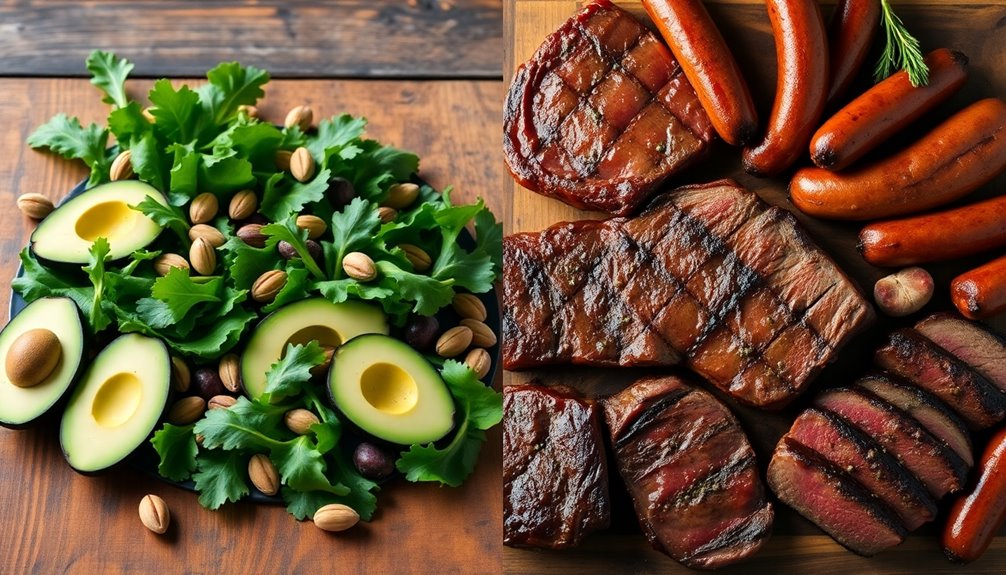
When comparing the Keto and Carnivore diets, you'll notice significant differences in dietary restrictions and macronutrient compositions.
The Keto diet allows for some carbohydrates and a variety of foods, while the Carnivore diet strictly focuses on animal products with no carbs at all. Additionally, the Keto diet emphasizes the inclusion of anti-inflammatory foods that can help mitigate inflammation and support overall health. This focus on nutrient-rich foods is key to optimizing energy levels and maintaining overall well-being. Furthermore, the Keto diet can improve insulin sensitivity, which may enhance metabolic health for those following this dietary approach.
Understanding these distinctions can help you choose the approach that best fits your health goals.
Dietary Restrictions Comparison
While both the Keto and Carnivore diets aim to promote health and weight loss, their dietary restrictions are markedly different.
The Keto Diet restricts carbohydrates to 5-10% of total daily calories, allowing low-carb fruits and vegetables, which boosts nutritional diversity. In contrast, the Carnivore Diet eliminates all carbohydrates, focusing solely on animal products.
This means the Keto Diet typically consists of 60-75% fat and offers a range of foods like nuts and dairy, while the Carnivore Diet is 100% animal-based, limiting your choices to meat, fish, eggs, and select dairy.
Consequently, the Carnivore Diet may lead to potential micronutrient deficiencies due to its restrictive nature, whereas the Keto Diet can better accommodate various health conditions through its broader dietary restrictions.
Macronutrient Composition Variances
Understanding the macronutrient composition of the Keto and Carnivore diets reveals essential differences that can impact your health and weight loss journey.
The Keto Diet typically consists of 60-75% fat, 15-30% protein, and only 5-10% carbohydrates, promoting ketosis through low carb intake. In contrast, the Carnivore Diet focuses solely on animal products, resulting in nearly 100% fat and protein, with virtually no carbohydrates.
While the Keto Diet allows for low-carb vegetables and nuts, the Carnivore Diet excludes all plant-based foods, leading to a less diverse nutrient profile. This variety in the Keto Diet supports a more balanced intake of nutrients, making it potentially more sustainable for long-term health compared to the restrictive nature of the Carnivore Diet.
Long-term Viability and Sustainability
As you consider long-term dietary options, the sustainability of the Keto and Carnivore diets becomes essential.
The Keto Diet offers greater long-term viability due to its flexibility, allowing you to enjoy a variety of foods, including low-carb vegetables, nuts, and dairy. This variety helps prevent nutrient deficiencies, supporting your overall health.
In contrast, the Carnivore Diet, while simpler, restricts all plant-based foods, which can lead to serious nutritional gaps over time.
Research shows that many people find it easier to stick with the Keto Diet, thanks to its balanced intake of macronutrients and essential vitamins.
If you're aiming for a sustainable dietary change, the adaptable nature of the Keto Diet often makes it the more suitable choice for lasting success.
Practical Tips for Success

To succeed on either the Keto or Carnivore diet, effective planning is essential. Start by creating a detailed meal plan that aligns with your chosen diet. For Keto, include a variety of low-carb foods, while Carnivore focuses solely on animal products.
Guarantee adequate hydration by drinking plenty of water, especially during the initial shift phase, as both diets can lead to increased water loss.
Make a gradual change to minimize digestive discomfort, reducing carbohydrate intake for Keto or eliminating plant foods for Carnivore.
Regularly monitor health markers like blood sugar and cholesterol levels to assess how your diet is affecting your health.
Finally, keep high-protein, low-carb snack options handy to maintain energy and adherence.
Choosing the Right Diet
When you're choosing between Keto and Carnivore, think about your personal health goals and lifestyle compatibility.
Consider any dietary restrictions you might have, as these can greatly impact your results and enjoyment.
Finding the right fit will help you stick with the diet and achieve your desired outcomes.
Personal Health Goals
Identifying your personal health goals is essential for choosing between the Keto and Carnivore diets.
If you're aiming for weight loss or improved blood sugar control, the Keto diet might suit you better, as it offers a balanced approach with some carb intake.
Those with specific health conditions should monitor their health markers closely and consult a healthcare provider before starting either diet.
If you prefer diet flexibility and a variety of foods, Keto allows for both animal products and plant-based foods.
On the other hand, if you want a straightforward meal plan with fewer choices, the Carnivore diet focuses solely on animal products and eliminates plant-based foods, simplifying your options.
Choose wisely based on your goals!
Lifestyle Compatibility
Choosing the right diet hinges on how well it fits into your lifestyle and daily routine.
The Keto Diet offers greater food variety, allowing you to enjoy low-carb vegetables and healthy fats, making it easier to integrate into social settings. This flexibility supports gradual weight loss and blood sugar control, aligning with many health goals.
On the other hand, the Carnivore Diet is an elimination diet focused solely on animal products, which can be challenging for those who appreciate diverse meal options. Its strict nature may require a stronger commitment, limiting your ability to adapt in various environments.
Ultimately, consider what aligns better with your preferences and lifestyle compatibility when choosing between these diets.
Dietary Restrictions Consideration
Understanding your dietary restrictions is essential in selecting the right diet for you, especially when considering the contrasting approaches of Keto and Carnivore.
Keto Dieters can enjoy a variety of foods, including low-carb vegetables, dairy, and nuts, which promotes a balanced nutrient intake. This flexibility helps reduce the risk of nutrient deficiencies that may arise from more restrictive diets.
In contrast, the Carnivore Diet focuses solely on animal products, eliminating all carbohydrates and plant-based foods. While this simplicity might appeal to some, it can lead to deficiencies in vitamins and fiber, impacting your overall health.
Ultimately, your choice should align with your health goals, preferences, and how strict you're willing to be regarding dietary restrictions.
Nutritional Focus of Each Diet
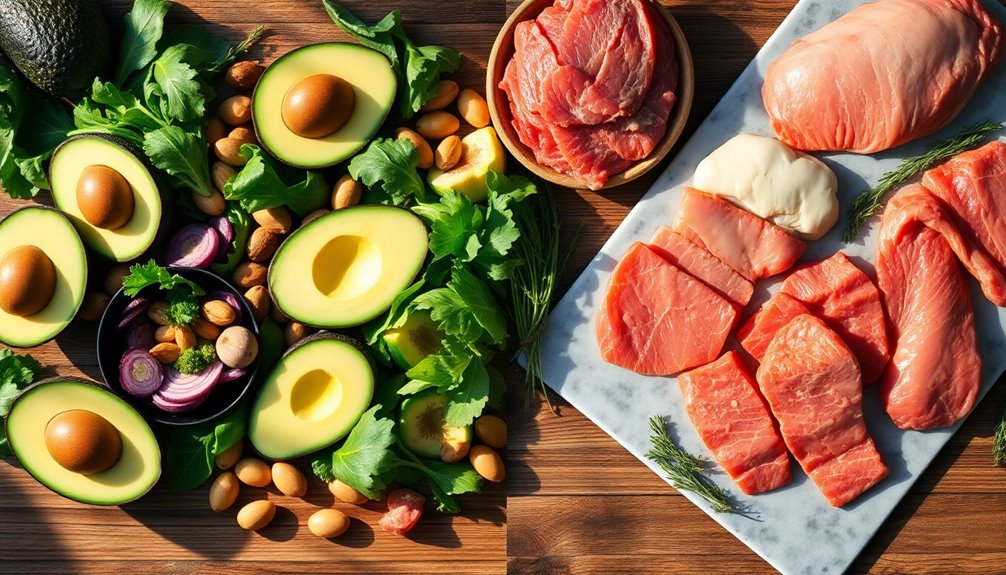
When comparing the nutritional focus of the Keto and Carnivore diets, it's clear that each has a distinct approach to macronutrient composition.
Here's how the two differ:
- Keto Diet: Typically 70-80% fat, 20% protein, and 5% carbohydrates, allowing low-carb vegetables and some nuts.
- Carnivore Diet: Consists of 100% animal products, resulting in a macronutrient ratio of fundamentally 100% protein and fat with zero carbs.
- Essential Nutrients: The Keto Diet offers a wider variety of essential nutrients from plant foods, while the Carnivore Diet risks deficiencies in vitamins like C.
- Dietary Restrictions: Keto permits certain plant foods, while Carnivore strictly excludes all plants.
Understanding these differences helps you choose a diet that aligns with your nutritional preferences and health goals.
Personal Health Goals and Considerations
Your personal health goals greatly influence which diet may work best for you. If you're aiming for significant weight loss, the Carnivore diet's zero-carb approach might be more effective.
However, if you value nutrient diversity and want a balanced nutritional intake, the Keto diet offers flexibility with low-carb plant options.
For blood sugar control, the Carnivore diet eliminates all carbohydrates, which can benefit those with insulin resistance, while the Keto diet reduces carbs to stabilize blood sugar.
Consider your dietary adherence too; the simplicity of the Carnivore diet appeals to some, while others may find the variety of the Keto diet easier to stick with in social situations.
Always consult a healthcare provider, especially if you have pre-existing health conditions.
Final Thoughts on Diets
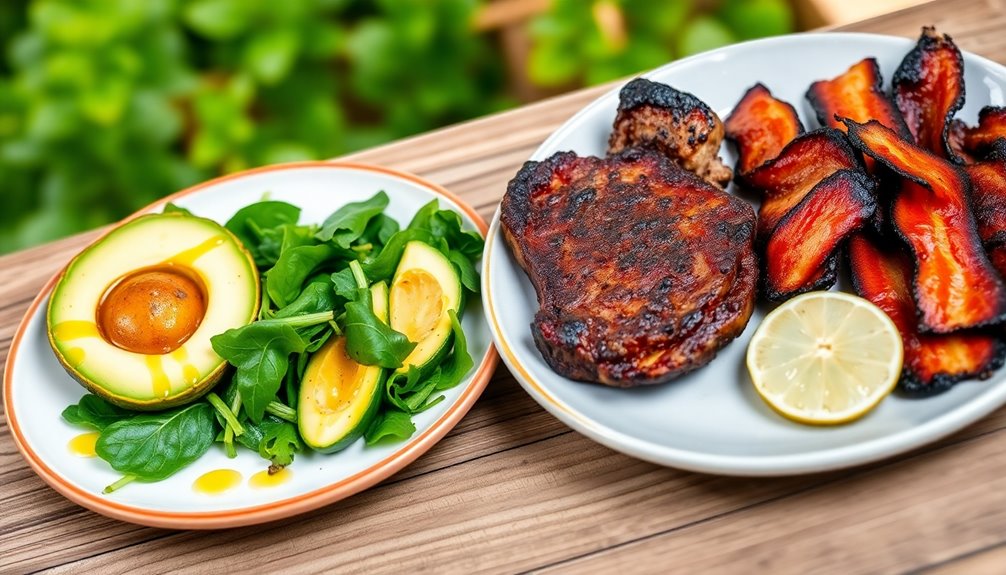
Ultimately, choosing between the Keto and Carnivore diets depends on your individual preferences and health goals. Both diets can lead to weight loss and health benefits, but they differ greatly in approach and sustainability.
Consider these factors:
- Food Choices: The Keto diet allows low-carb vegetables and some fruits, while the Carnivore diet is exclusively animal-based.
- Micronutrient Deficiencies: The Carnivore diet's restrictions may lead to deficiencies, whereas the Keto diet offers a wider variety of nutrients.
- Individual Responses: Your body may react differently to each diet, so personal experimentation is key.
- Sustainability: The diverse food options in the Keto diet may make it easier to stick to long-term.
Ultimately, consult with healthcare providers to find the best fit for you.
Conclusion
In the end, choosing between keto and carnivore is like selecting a path in a dense forest—each has its unique twists and turns. Both diets offer distinct health benefits, but your personal goals and preferences will guide you to the right choice. Whether you crave variety or simplicity, it's crucial to listen to your body and consider what fuels your well-being best. Remember, your journey to health is yours to shape, so choose wisely!

